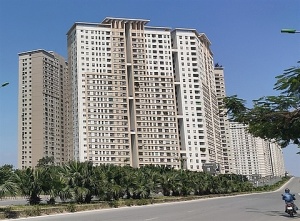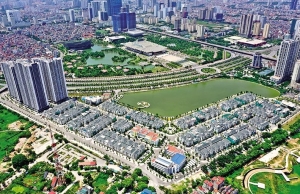Vietnam may become largest retail real estate market in region
Minh remarked that the future of the retail real estate industry will be prosperous due to international companies "constantly investing in expanding markets".
 |
"We can see that the Vietnamese retail market will be able to match the growth rate of Bangkok, currently the largest retail market in Southeast Asia, within the next 1-3 years, as the average retail product prices in both markets move closer to each other," she added.
According to Minh, global investors have always seen Vietnam's real estate market as very promising and are willing to infuse capital, including from sources other than loans. "Several South Korean, Japanese, European, and American investors may invest without the need of institutional funding when targeting the Vietnamese market, but they have no means to invest cash if the legal corridor has not provided them with sufficient peace of mind," she said.
In addition, according to Minh, the hotel and tourist industry has recovered, and the market's logistic systems are continuing to expand. "Apple decided to develop a MacBook plant in Vietnam very recently. This will contribute to the continued development of the Apple and Samsung supply chain enterprises in the country, and will generate favourable development in commercial and service real estate such as offices, retail, and hotels; industrial real estate; and well-developed logistics."
Furthermore, she stated that the residential real estate sector is now the most affected segment in the market.
| "The regulatory restrictions on housing developments and business operations, and recent political instability, has produced apprehension among both international and local investors over the real estate industry. They are concerned that construction-ready housing developments may be unable to overcome legal obstacles. This will have repercussions when the market's vast supply expands at the same time, resulting in an overstock without the ability to lower prices" |
"The real estate market generated a highly negative feeling across the whole economy in the second half of last year, leaving residential real estate as the most impacted market segment currently," said Minh.
She added that the capital market is tight, real estate credit is a very heated topic, and bonds are tight.
"Combined with the bond issue's negative impact on private investors, this prevents substantial capital flow into the market, even though real estate is an industry that needs enormous resources to accomplish projects, particularly in the long term," Minh said.
 | Tough times for real estate businesses Financial statements in the fourth quarter of 2022 clearly reflected the difficulties that the market suffered last year. |
 | Varying factors to determine the fate of real estate Experts are increasingly hopeful that the real estate market in 2023 and beyond has a good chance of recovery, with liquidity volume returning gradually and supply expanded in the market. |
 | Spike in value of real estate inventory for Q4/2022 The latest report from the Ministry of Construction (MoC) shows that by the end of Q4 2022, the total value of inventory held by the major property developers showed a 20 per cent jump on-year. |
What the stars mean:
★ Poor ★ ★ Promising ★★★ Good ★★★★ Very good ★★★★★ Exceptional
Related Contents
Latest News
More News
- Real estate investment trusts pivotal for long-term success (February 02, 2026 | 11:09)
- Dong Nai experiences shifting expectations and new industrial cycle (January 28, 2026 | 09:00)
- An Phat 5 Industrial Park targets ESG-driven investors in Hai Phong (January 26, 2026 | 08:30)
- Decree opens incentives for green urban development (January 24, 2026 | 11:18)
- Public investment is reshaping real estate’s role in Vietnam (January 21, 2026 | 10:04)
- Ho Chi Minh City seeks investor to revive Binh Quoi–Thanh Da project (January 19, 2026 | 11:58)
- Sun Group launches construction of Rach Chiec sports complex (January 16, 2026 | 16:17)
- CEO Group breaks ground on first industrial park in Haiphong Free Trade Zone (January 15, 2026 | 15:47)
- BRIGHTPARK Entertainment Complex opens in Ninh Binh (January 12, 2026 | 14:27)
- Ho Chi Minh City's industrial parks top $5.3 billion investment in 2025 (January 06, 2026 | 08:38)

 Tag:
Tag:




















 Mobile Version
Mobile Version